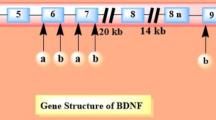Abstract
Neurotrophic factors are endogenous soluble proteins that regulate long-term survival and differentiation of neurons of the peripheral and central nervous systems. These factors play an important role in the structural integrity of the nervous system, and therefore are good candidates as therapeutic agents for neurodegenerative diseases. However, recent studies have revealed some unexpected, novel roles of neurotrophic factors. Of particular significance is the discovery of the new functions of brain-derived neurotrophic factor (BDNF) and glia-derived neurotrophic factor (GDNF). Physiological experiments indicate that BDNF may serve as regulatory factors for synaptic transmission as well as for learning and memory. Gene targeting studies demonstrate that GDNF may be essential for development of the enteric nervous system (ENS) and kidney organogenesis. These results not only provide new insights into our understanding of the function of neurotrophic factors but may also have significant implications in the therapeutic usages of neurotrophic factors.
Similar content being viewed by others
Author information
Authors and Affiliations
Additional information
Received: 12 November 1996 / Accepted: 26 March 1997
Rights and permissions
About this article
Cite this article
Shen, L., Figurov, A. & Lu, B. Recent progress in studies of neurotrophic factors and their clinical implications. J Mol Med 75, 637–644 (1997). https://doi.org/10.1007/s001090050147
Issue Date:
DOI: https://doi.org/10.1007/s001090050147



